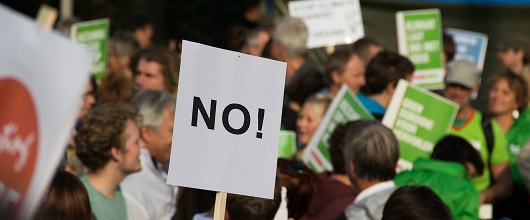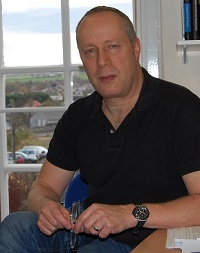Professor Reicher on Turkey
This week Steve Reicher, Professor of Social Psychology, was in Istanbul as an observer under the auspices of the International Society for Political Psychology at the trial of an academic colleague accused of terrorist propaganda by the Turkish Government.
This is his personal first-hand account. Names have been changed for the safety of those involved.

I am sitting in Court room 32 of Istanbul’s fortress-like High Court, observing the trial of a young colleague, Ekren. She is one of several people on trial today, fellow academics, journalists, even someone who wrote a short story in which the government was described as a ‘dragon’. Apparently that is enough to have been taken before the criminal bench.
Until she walked into the room Ekren didn’t even know what she was charged with. Now, she is told: terrorist propaganda. If found guilty she faces over seven years in prison.
Ekren is a most unlikely terrorist or propagandist. She is a young social psychologist, a friend and a collaborator who – like me – is interested in group behaviour and processes of intergroup conflict. Two years ago, in early 2016, she was one of 1128 academics who signed a ‘peace petition’ which condemned the Turkish government’s attack on the Kurds for widespread attacks on civilians and humanitarian abuses, and for fomenting further violence. Ekren was not a radical, let alone a seasoned activist. She simply despaired at the unfolding tragedy in her country and felt that something had to be said about it.
The response of President Erdogan was swift and extreme. He denounced the signatories as anti-Turkish and as terrorist sympathisers, if not terrorists themselves. He then sought to get them sacked from their jobs. With deliberate ambiguity he called on all Universities to do whatever was necessary to deal with the signatories. Those working in public Universities were immediately dismissed as were some in private Universities. But other private University administrations stood up to this blatant assault on academic freedom and refused to do the President’s bidding.
It wasn’t just that people were dismissed. They were denied the right ever to work in the public sector and details of their dismissals were put on their social security files to make it very hard to get any sort of job. They had their pension rights removed. They had their passports removed. They were denied any access to benefits or state services. Aisha, another colleague who was sacked, has a five year old son. When he was ill, she couldn’t use public hospitals. She had to take him to a private clinic. But she had no income. Aisha has had to sell up to keep going. She and her family survive, just. For now.
But the effect of Erdogan’s attacks is not just financial. It is psychological. Another young psychologist, Alisan, lost his research assistantship after signing the petition. He speaks of the isolation. Many of his past colleagues are afraid to be associated with him. He feels stigmatised. The networks that once sustained him are gone. The organisation ‘Academics for Peace’, which originated the petition, has approached the Turkish Psychological Association asking for mental health support for the signatories. Many are depressed. Many are anxious. Already there have been three suicides from amongst them.
The whole strategy against those academics who criticised Erdogan is to take their academic identities away and turn them into non-persons. Now he is taking the strategy one step further – from taking away people’s livelihoods to threatening their freedom. Beginning last December legal proceedings were started against the peace signatories. Ekren still has her job thanks to a brave administration, but she is in the first wave of those being charged.
In order to ensure that the government cannot act in the shadows, Academics for Peace has asked for international observers to come to the courtroom. We can show those on trial that they are not forgotten, that they are valued colleagues. If Erdogan wants to make them non-persons we, by contrast, can help them know that they matter as part of a broad academic community. Ekren is particularly passionate on this point. ‘Get people to come,’ she says, ‘when there are people who are watching, it makes a difference. It sustains us.’
We can also shine an international spotlight on what is going on so that Erdogan is made accountable for his actions. Will it make any difference to government policy? It is hard to say. But Ekren’s lawyer makes another point. ‘Without your presence,’ she says, ‘the judges are rude to us, they interrupt us, it is hard for us to be heard. However, when you are there they are much more polite and our voice does get through. The judges do at least have to appear as if they have respect for the rule of law.’
In the end, Ekren’s hearing is brief. The court rejects an application to dismiss the charge on the basis that there is no evidence. The dossier against Ekren simply contains the text of the peace petition and a commentary on this text. It does not show any connection to any ‘terrorist’ organisation, which is the basis of the charge. It doesn’t because it cannot. There is no connection. But the court does give Ekren time to prepare her defence. This too is part of a strategy: keep people off guard, make them feel vulnerable, incapable of acting, certainly unable to question the government.
What is going on in Turkey is a situation where the right to be critical of the state is being destroyed, where academic freedom is all but gone and where an independent civil society becomes impossible. As if to underline this, the night before Ekren’s trial, police broke into the houses of 11 leaders of the Turkish Medical Association and took them into custody. The Association had issued a declaration in response to the recent Turkish incursion into Northern Syria. They made the seemingly self-evident statement that war is a disaster for human welfare. But in today’s Turkey simple truths are too much for the government. Erdogan called the Association ‘terrorists’. He described them as ‘filth’. He removed their liberty.
Perhaps I personally am particularly sensitive to these issues and particularly attuned to the value of academic solidarity. My grandfather and great uncle managed to leave Nazi Germany and come to the UK through the support of the Academic Assistance Council, precursor of today’s Council for at Risk Academics (CARA). But I think what is happening in Turkey, and the plight suffered by our friends and colleagues should be of concern to all academics and all those who value academic freedom.
 In the next few weeks we will be discussing with our colleagues in Turkey and with our academic associations (we went to Turkey under the auspices of the International Society for Political Psychology) what can best be done to help them. Ideas include an emergency fund for people like Aisha; sanctuary scholarships for those who can leave the country and academic collaborations for those who are able to work inside Turkey; honorary appointments to sustain academic affiliations – and a host of other ideas besides. When we have worked out the priorities we will post further information. Meanwhile if anyone wants to know more – or do more – please contact me on [email protected].
In the next few weeks we will be discussing with our colleagues in Turkey and with our academic associations (we went to Turkey under the auspices of the International Society for Political Psychology) what can best be done to help them. Ideas include an emergency fund for people like Aisha; sanctuary scholarships for those who can leave the country and academic collaborations for those who are able to work inside Turkey; honorary appointments to sustain academic affiliations – and a host of other ideas besides. When we have worked out the priorities we will post further information. Meanwhile if anyone wants to know more – or do more – please contact me on [email protected].
Steve Reicher
Professor of Social Psychology
School of Psychology & Neuroscience
Category Public interest stories